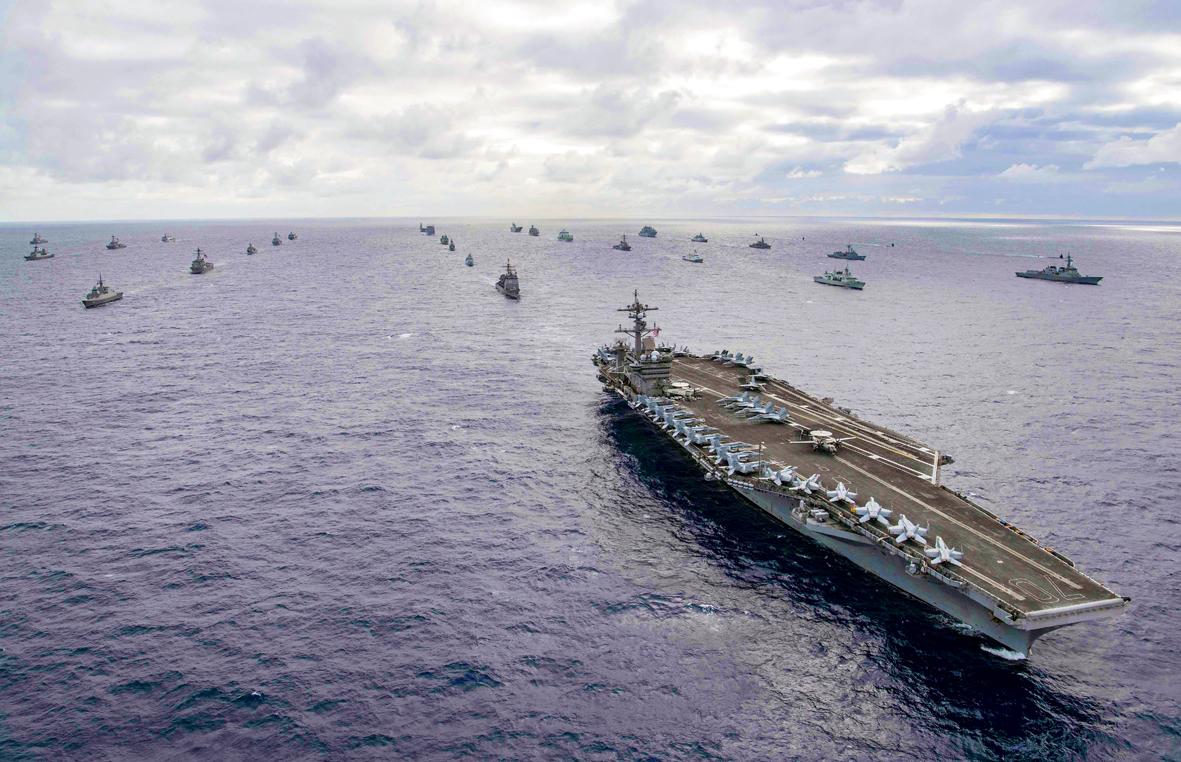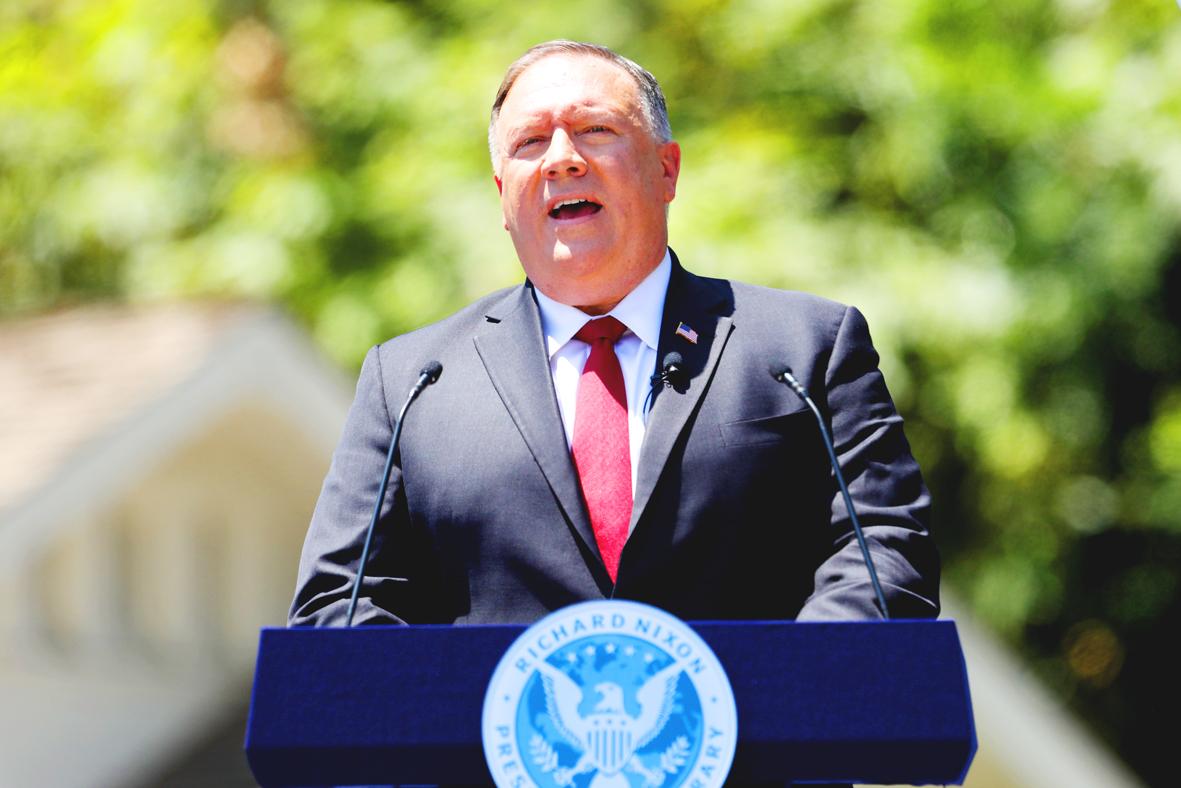The US Senate on Thursday passed its version of the US National Defense Authorization Act (NDAA) for next year, including provisions that support Taiwan’s participation in the Rim of the Pacific Exercise (RIMPAC), the world’s largest maritime warfare exercise, if appropriate.
The bill cleared the Senate floor in a 86-14 vote.
Provisions that include Taiwan are mentioned in sections 1258 and 1259 of the bill, which reiterates that the Taiwan Relations Act (TRA) and the “six assurances” provided by the US to Taiwan in July 1982 are “the foundation for United States-Taiwan relations.”

Photo: AFP / US NAVY / DYLAN M. KINEE
The “six assurances” were given by then-US president Ronald Reagan in 1982 and include pledges not to set a date for ending arms sales to Taiwan, not to hold prior consultations with China regarding arms sales to Taiwan, and not to be a mediator between Taiwan and China.
They also include assurances that the US will not revise the TRA or press Taiwan to enter into negotiations with China.
The NDAA also highlights US support for the development of Taiwan’s military, including through arms sales, exchanges between top defense officials and military exercises.

Photo: EPA-EFE
The exercises could include the RIMPAC, if appropriate, the NDAA says, although Taiwan has never participated before.
The NDAA also acknowledges China’s “increasingly coercive and aggressive behavior” toward Taiwan, contrary to the US’ expectation of a “peaceful resolution” of Taiwan’s future.
Citing the TRA, the NDAA says that the US would maintain the capacity “to resist any resort to force or other forms of coercion that would jeopardize the security, or the social or economic system, of the people on Taiwan, including the capacity of the United States armed forces to deny a ‘fait accompli’ operation by the People’s Republic of China to rapidly seize control of Taiwan.”
A section of the NDAA also advises the US Department of Defense to conduct port calls in Taiwan with two US naval hospital ships — the USNS Comfort and the USNS Mercy.
The port calls would allow “United States personnel to benefit from the expertise of Taiwanese personnel in light of the successful response of Taiwan to COVID-19” and would allow the two sides to continue collaborating on COVID-19 responses, the NDAA says.
The visits would also improve cooperation between the two sides in the areas of military medicine, humanitarian assistance and disaster relief, it said.
The US House of Representatives on July 21 passed its own version of the NDAA.
The two houses would soon begin negotiations to hammer out the differences in their competing bills before a final version can be signed into law by US President Donald Trump.
Separately on Thursday, US Secretary of State Mike Pompeo contrasted the responses of Taiwan and China to Washington’s policies.
“We opened our arms to Chinese citizens, only to see the Chinese Communist Party exploit our free and open society,” Pompeo said.
“We marginalized our friends in Taiwan, which later blossomed into a vigorous democracy,” he said.
Ministry of Foreign Affairs spokeswoman Joanne Ou (歐江安) yesterday thanked the US government for repeatedly voicing support for Taiwan publicly and urged other countries to face the threats posed by Beijing’s expansionism.
Whatever means China uses to squeeze Taiwan’s space in the global community, the government would never succumb to the pressure, Ou said in a statement, adding that the government would continue working with the US and other like-minded countries to defend democratic systems and a rule-based international order.
Ou also thanked the US Congress for continuing to promote Taiwan-US exchanges in military and security affairs.
The NDAA includes many provisions friendly to Taiwan, she said, adding that the ministry would monitor the bill’s development and maintain contact with US agencies to facilitate further Taiwan-US security cooperation.
Additional reporting by Lin Chia-nan

NATIONAL SECURITY THREAT: An official said that Guan Guan’s comments had gone beyond the threshold of free speech, as she advocated for the destruction of the ROC China-born media influencer Guan Guan’s (關關) residency permit has been revoked for repeatedly posting pro-China content that threatens national security, the National Immigration Agency said yesterday. Guan Guan has said many controversial things in her videos posted to Douyin (抖音), including “the red flag will soon be painted all over Taiwan” and “Taiwan is an inseparable part of China,” while expressing hope for expedited “reunification.” The agency received multiple reports alleging that Guan Guan had advocated for armed reunification last year. After investigating, the agency last month issued a notice requiring her to appear and account for her actions. Guan Guan appeared as required,

Japan and the Philippines yesterday signed a defense pact that would allow the tax-free provision of ammunition, fuel, food and other necessities when their forces stage joint training to boost deterrence against China’s growing aggression in the region and to bolster their preparation for natural disasters. Japan has faced increasing political, trade and security tensions with China, which was angered by Japanese Prime Minister Sanae Takaichi’s remark that a Chinese attack on Taiwan would be a survival-threatening situation for Japan, triggering a military response. Japan and the Philippines have also had separate territorial conflicts with Beijing in the East and South China

A strong cold air mass is expected to arrive tonight, bringing a change in weather and a drop in temperature, the Central Weather Administration (CWA) said. The coldest time would be early on Thursday morning, with temperatures in some areas dipping as low as 8°C, it said. Daytime highs yesterday were 22°C to 24°C in northern and eastern Taiwan, and about 25°C to 28°C in the central and southern regions, it said. However, nighttime lows would dip to about 15°C to 16°C in central and northern Taiwan as well as the northeast, and 17°C to 19°C elsewhere, it said. Tropical Storm Nokaen, currently

PAPERS, PLEASE: The gang exploited the high value of the passports, selling them at inflated prices to Chinese buyers, who would treat them as ‘invisibility cloaks’ The Yilan District Court has handed four members of a syndicate prison terms ranging from one year and two months to two years and two months for their involvement in a scheme to purchase Taiwanese passports and resell them abroad at a massive markup. A Chinese human smuggling syndicate purchased Taiwanese passports through local criminal networks, exploiting the passports’ visa-free travel privileges to turn a profit of more than 20 times the original price, the court said. Such criminal organizations enable people to impersonate Taiwanese when entering and exiting Taiwan and other countries, undermining social order and the credibility of the nation’s